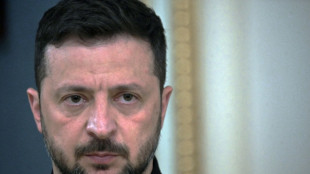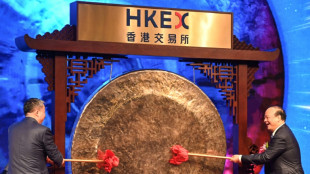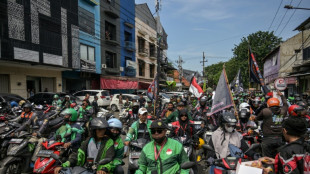Taiwan says 'willing' to talk to China as island boosts defences
Taiwan is prepared to talk to China as equals but it will continue to build up its defences, the island's President Lai Ching-te said Tuesday as he marked his first year in office.
Lai, a staunch defender of Taiwan's sovereignty and detested by Beijing, delivered wide-ranging remarks on the need "to prepare for war to avoid war" and also bolster the island's economic resilience.
After promising to stand up to China and defend democracy at his inauguration, Lai insisted Taiwan was "willing" to communicate with Beijing if there was "parity and dignity".
China has rebuffed Lai's previous offers to talk.
"Peace is priceless and there are no winners in war," Lai said, but added "we cannot have illusions" and vowed to continue "to strengthen our national defence capabilities".
Taiwan will "actively cooperate with international allies, shoulder to shoulder to exert the power of deterrence, to prepare for war to avoid war, and to achieve the goal of peace," Lai told journalists at the Presidential Office.
China, which claims Taiwan is part of its territory and has threatened to use force to annex it, has held several rounds of large-scale military drills around the island since Lai took office.
Taiwan's coast guard warned Monday that China may use "cognitive warfare" to "disrupt public morale" as Lai marks the first anniversary of his inauguration.
As Taiwan comes under pressure from Washington to move more factories to US soil and reduce their trade imbalance, Lai said Taiwan would not "put all our eggs in one basket".
Taiwan would increase its economic resilience by diversifying markets and boosting domestic demand.
Lai also announced plans to set up a sovereign wealth fund to "boost Taiwan's economic momentum", but did not provide details about its size.
The president has seen his first term in the top job engulfed in domestic political turmoil as opposition parties, which control the parliament, seek to stymie his agenda.
- Falling approval rating -
The main opposition Kuomintang party (KMT) has called Lai a "dictator" and accused him of pushing Taiwan closer to war with China, while Lai's Democratic Progressive Party (DPP) suggests the KMT is a tool of Beijing and is undermining Taiwan's security.
Tensions have escalated into physical fights inside parliament and thousands of supporters of the DPP and opposition parties holding rival street protests.
On Tuesday, Lai said the government wanted to "strengthen cooperation among political parties" and that his national security team would start providing "important national security briefings" to the opposition.
"On the basis of the same facts, we can exchange views frankly and sincerely, discuss national affairs, and work together to face the challenges of the country," Lai said.
Analysts said Lai's remarks were more restrained than in previous speeches, which have drawn criticism from Beijing.
"Lai is dialling down the messaging and keeping Taiwan's head low to avoid getting into anybody's crosshairs amid this geopolitical uncertainty," Wen-Ti Sung, a nonresident fellow at the Atlantic Council's Global China Hub, told AFP.
National Cheng Kung University politial science professor Wang Hung-jen said Lai "was careful to know when to stop".
Lai has seen his approval rating fall to 45.9 percent from 58 percent nearly a year ago, according to a survey by Taiwanese Public Opinion Foundation in April.
His disapproval rating rose to 45.7 percent -- the highest since he took office -- which the polling group linked to the Lai government's handling of US tariffs on Taiwan and the DPP's unprecedented recall campaign targeting the opposition.
DPP supporters are seeking to unseat around 30 KMT lawmakers through a legal process that allows legislators to be removed before the end of their term.
While the threshold for a successful recall is high, the DPP only needs to win six seats to wrest back control of parliament.
A rival campaign to unseat 15 DPP members has been embroiled in controversy after KMT staffers were accused of forging the signatures of dead people.
The KMT has also threatened to recall Lai.
J.Hochholzer--SbgTB



